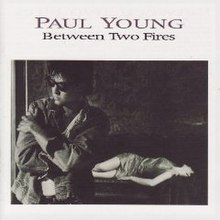Between Two Fires (album)
| Between Two Fires | ||||
|---|---|---|---|---|
 |
||||
| Studio album by Paul Young | ||||
| Released | 20 October 1986 | |||
| Recorded | 1986 @ Lark Studios, Carimate & Logic Studios, Milan, Italy (also mixed at Logic Studios - mastering at Masterdisk) | |||
| Genre | Pop rock, soul | |||
| Label | Columbia/CBS Records | |||
| Producer |
Hugh Padgham Paul Young Ian Kewley |
|||
| Paul Young chronology | ||||
|
||||
| Singles from Between Two Fires | ||||
|
||||
| Professional ratings | |
|---|---|
| Review scores | |
| Source | Rating |
| Rolling Stone | (3.5/5) |
Between Two Fires is the third solo album by the English singer Paul Young. Released in October 1986, it reached #4 on the UK Album Chart, and #77 on the U.S. Billboard Hot 200 album chart. The album has been certified Platinum (300,000 copies) by the British Phonographic Industry.
Three singles were taken from the album; "Wonderland", "Some People", and "Why Does a Man Have to Be Strong", though none of these made the UK Top 20 unlike Young's previous singles. "Wonderland", written by Betsy Cook who also provided backing vocals on the album, reached #24 in the UK (Cook would later release her own version of the song on her 1992 album The Girl Who Ate Herself). "Some People" reached #56 in the UK and #65 in the U.S., while "Why Does a Man have to be Strong" reached #63 in the UK. After the numerous covers contained in the previous two works, Between Two Fires contained many more self-penned compositions, and Young actually co-produced, co-wrote and co-arranged most of the tracks.
"Through the first few listens, the album seems muted and reticent, a bashful mishmash of pop riffs and references. But after those initial plays, Between Two Fires takes on remarkable colours, as if its ten tracks were strips of film coming to life in a photographer's darkroom. The record finally reveals itself to be a detailed portrait of the problems human beings have with sharing things – whether it's a whole planet or just a queen-size bed." (from Laura Fissinger's album review on RollingStone.com)
All tracks composed by Paul Young and Ian Kewley; except where indicated.
...
Wikipedia
